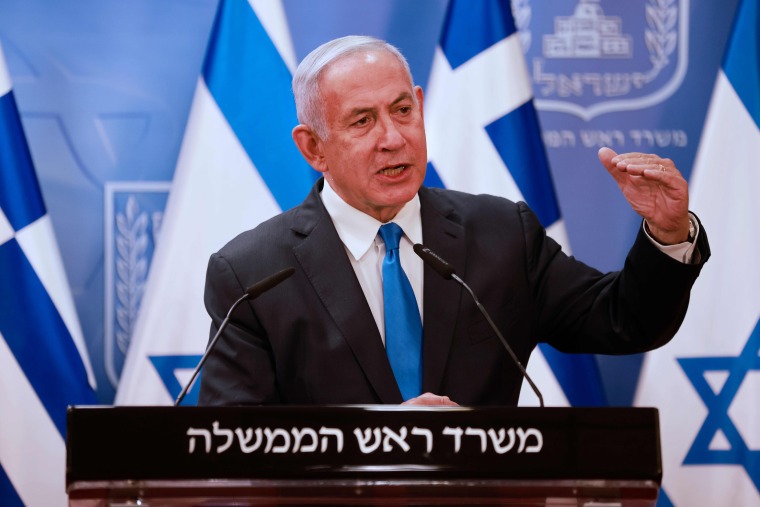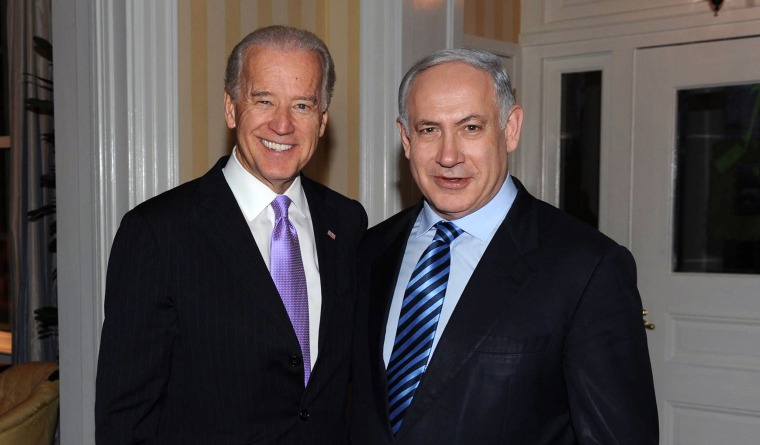In his first three weeks in office, President Joe Biden has made a flurry of phone calls to American allies around the world, including the leaders of Canada, Britain, France and Japan.
But one close American ally’s leader has so far been left conspicuously off the new president’s call list: Israeli Prime Minister Benjamin Netanyahu.
While it is clear that Biden has his hands full with a myriad domestic challenges, every day the phone doesn’t ring adds to concerns in Israel that Netanyahu is being frozen out by the new Democratic administration because of his close ties with Donald Trump and his public antagonism of Barack Obama.
The contrast between Biden and Trump is stark: Trump called Netanyahu within two days of taking office in 2017.
Download the NBC News app for breaking news and politics
“It’s a clear sign of displeasure from President Biden with the fact that Prime Minister Netanyahu was perceived in Washington for the last 12 years as almost a card-carrying member of the Republican Party,” said Dani Dayan, a former Israel consul-general in New York.
Dayan was appointed to the post by Netanyahu in 2016 but is now part of New Hope, a right-wing political party led by former allies of Netanyahu who are running against him in upcoming elections.

During his time in the United States, Dayan said he went out of his way to meet Democrats to counter the perception that the Israeli prime minister was aligned with the Republicans — first because of what was widely seen as Netanyahu’s implicit endorsement of Mitt Romney in the 2012 election and later his warm embrace of Trump.
Danny Danon, Israel’s former ambassador to the United Nations and a member of Netanyahu’s Likud party, was blunter.
In a tweet addressed to Biden, he asked: “Might it now be time to call the leader of Israel, the closest ally of the U.S.?” before typing out a phone number for Netanyahu’s office. (The number appeared to be out of service when NBC News attempted to call it.)
Israeli media commentators have also been counting the days and interpreting a deliberate snub. Biden spoke to Russia President Vladimir Putin a week after being inaugurated and to Chinese leader Xi Jinping on Wednesday night.
“To Netanyahu's sorrow, it seems that the Americans are very interested in proving that Biden is not such a close personal friend of the prime minister,” one columnist with Makor Rishon, a conservative newspaper, wrote. “Is Biden ghosting Netanyahu?” another headline asked.
Netanyahu has shrugged off the lack of contact from the White House, pointing out that Biden has not yet called any Middle Eastern leaders.
Biden “is making calls to world leaders according to the order he sees fit,” he said. “The Israel-U.S. alliance is strong and so is our friendship of almost 40 years, though we may not agree on everything,"
White House Press Secretary Jen Psaki told a news briefing Thursday that Biden was looking forward to Netanyahu, without providing a date.
Netanyahu was "obviously somebody that he has a long-standing relationship with," she said.
Biden, a former chairman of the Senate Foreign Relations Committee, has met every Israeli prime minister since Golda Meir and has known Netanyahu for decades. He has always insisted their personal relationship is warm despite their policy disagreements.

“Bibi, I don't agree with a damn thing you say but I love you,” Biden once wrote in an autograph for Netanyahu, using his popular nickname.
But Biden’s first visit to Israel as vice president in 2010 tested that bond. Hours after Air Force Two touched down in Tel Aviv, the Israeli government announced 1,600 new housing units in an east Jerusalem settlement.
The move was seen as flagrantly disrespectful and forced Biden to issue a statement of condemnation. Netanyahu’s allies said he was blindsided by the announcement — made by the interior ministry — and hadn’t intended to cause embarrassment.
Biden does not appear to have held a grudge but tensions with Israel would only rise over the course of the Obama-Biden administration — culminating with Netanyahu’s thundering public denunciations of Obama’s efforts to reach a nuclear agreement with Iran.
The same accord is likely to be an early point of contention. While Biden has shown little ambition to try reviving Israeli-Palestinian peace talks — avoiding one area of potential conflict with Netanyahu — he is eager to swiftly return the U.S. to the Iran nuclear deal, which Trump withdrew from in 2018. Netanyahu remains opposed to the deal but is expected to be more discreet in his opposition.
Antony Blinken, Biden’s secretary of state, has already caused irritation in Jerusalem on another front after suggesting the new administration would not adhere to Trump’s decision to recognize Israeli sovereignty over the Golan Heights, a strategic plateau Israel captured from Syria in 1967. Netanyahu’s office responded with a terse statement saying the region “will remain forever a part of the State of Israel.”
But on the signature element of Trump’s Israel policy, the new administration has accepted there is no going back: Blinken acknowledged that the U.S. embassy would remain in Jerusalem, although there will also be renewed diplomatic contact with the Palestinians.
When asked about the response by the Israeli prime minister’s office to Blinken’s comments on the Golan Heights, a State Department spokesperson said, “The secretary spoke to this earlier this week and we have nothing further.”
Dan Shapiro, former U.S. ambassador to Israel under Obama, said that while many in Israel and the U.S. were reading deeply into the question of who gets called when, the reality is that Biden is simply focused on the Covid-19 pandemic in the U.S. and the accompanying economic fallout.
“The lack of a phone call so far has little to do with Netanyahu and Israel, and far, far more to do with what Biden sees as his priorities,” he said.CORRECTION (Feb. 11, 2021, 5:10 p.m. ET): An earlier version of this article incorrectly included China on a list of American allies that Biden has called. Although Biden did call the Chinese president on Wednesday, the country is not an ally of the United States.
